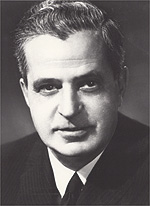Related Research Articles

Jean-Jacques Bertrand was a Canadian politician and lawyer who served as the 21st premier of Quebec, from October 2, 1968, to May 12, 1970. He led the Union Nationale party.
The 1960 Quebec general election was held on June 22, 1960, to elect members of the Legislative Assembly of Quebec, Canada. It was one of the most significant elections in Quebec history, rivalled perhaps only by the 1976 general election. The incumbent Union Nationale, led by Antonio Barrette, was defeated by the Quebec Liberal Party, led by Jean Lesage.
The 1956 Quebec general election was held on June 20, 1956, to elect members of the Legislative Assembly of Quebec, Canada. The incumbent Union Nationale, led by Maurice Duplessis, won re-election, defeating the Quebec Liberal Party, led by Georges-Émile Lapalme.
The 1952 Quebec general election was held on July 16, 1952, to elect members of the Legislative Assembly of the Province of Quebec, Canada. The incumbent Union Nationale, led by Maurice Duplessis, won re-election, defeating the Quebec Liberal Party, led by Georges-Émile Lapalme.

The Parti national populaire was a minor political party in Quebec, Canada that operated in the 1970s.

Gabriel Loubier was a politician in Quebec, Canada. He served as leader of the Union Nationale party from 1971 to 1974, and as Leader of the Opposition in the National Assembly of Quebec from 1971 to 1973.
The Ralliement créditiste du Québec was a provincial political party in Quebec, Canada, that operated from 1970 to 1978. It promoted social credit theories of monetary reform, and acted as an outlet for the expression of rural discontent. It was a successor to an earlier social credit party in Quebec, the Union des électeurs which ran candidates in the 1940s.

Marcel Masse was a Canadian politician. He served as a Quebec MLA, federal MP and federal cabinet minister.
Mario Beaulieu was a Canadian notary, politician and senator.

The Union nationale was a conservative and nationalist provincial political party in Quebec, Canada, that identified with Québécois autonomism. It was created during the Great Depression and held power in Quebec from 1936 to 1939, and from 1944 to 1960 and from 1966 to 1970. The party was founded by Maurice Duplessis, who led it until his death in 1959.
Maurice Bellemare, was a politician in Quebec, Canada. He was known as Le Vieux Lion de la Politique Québécoise because of his colourful style and his many years of public office. Bellemare was one of the last survivors of the Union Nationale party.
The 28th Legislative Assembly of Quebec / 28th National Assembly of Quebec was the provincial legislature in Quebec, Canada that was elected in the 1966 Quebec general election. The name change from Legislative Assembly of Quebec to National Assembly of Quebec came into effect on December 31, 1968. The assembly sat for five sessions, from 1 December 1966 to 12 August 1967; on 20 October 1967 ; from 20 February 1968 to 18 December 1968; from 25 February 1969 to 23 December 1969; and from 24 February 1970 to 12 March 1970. The Union Nationale government was led by Daniel Johnson until his death in office, and then by Jean-Jacques Bertrand. The Liberal opposition was led by Jean Lesage and then by Robert Bourassa.
The 25th Legislative Assembly of Quebec was the Quebec, Canada, provincial political legislature that existed from June 20, 1956, and June 22, 1960. The Union Nationale was the governing party for the fourth consecutive mandate. It was also Maurice Duplessis last term as Premier of Quebec. He died in office in 1959 and was succeeded in less than a year by Paul Sauvé and former cabinet Minister Antonio Barrette after Sauvé died less than four months after being sworn as Premier.
The 24th Legislative Assembly of Quebec was the Quebec, Canada provincial legislature that existed from July 16, 1952, to June 20, 1956. This assembly marked the third consecutive term of the Union Nationale as the governing party and the fourth under the leadership of Maurice Duplessis.
André Léveillé was a Canadian politician in Quebec.
Jean-François Fortin is a Canadian politician. He was elected to represent the riding of Haute-Gaspésie—La Mitis—Matane—Matapédia in the 2011 federal election as a member of the Bloc Québécois, and was chosen interim parliamentary leader of the Bloc on February 26, 2014.
The 2016 Parti Québécois leadership election occurred from October 5 to October 7, 2016 due to the resignation of Parti Québécois leader Pierre Karl Péladeau on May 2, 2016. Jean-François Lisée was elected on the second ballot with 50.63% of the vote.
The 2017 Bloc Québécois leadership election was held on March 14, 2017 to choose a successor to Gilles Duceppe, who resigned on October 22, 2015 after the 2015 Canadian federal election. Rhéal Fortin, MP for Rivière-du-Nord, had been serving as interim leader since Duceppe's resignation. The election was initially scheduled for April 22, 2017 but ended on March 14, 2017 at the end of the nomination period, because there was only one candidate. Ouellet's tenure was controversial due to her staunch separatist views, and, following a leadership vote, she was forced to resign in June 2018.
The 2019 Bloc Québécois leadership election was initiated by the resignation of party leader Martine Ouellet in June 2018. While originally scheduled to be held on February 24, 2019 on a one member, one vote basis, Yves-François Blanchet, as the only candidate in the race following the nomination deadline of January 15, 2019, was officially acclaimed Leader of the Bloc Québécois on January 17, 2019.
References
- ↑ McKenzie, Bob (September 25, 1961). "Johnson Edges out Betrand". Montreal Gazette. p. 1.
- ↑ Winter, Hal (June 23, 1969). "Betrand retains reins". Montreal Gazette. p. 1.
- ↑ Radwanski, George (June 20, 1971). "Loubier win leaves NU strife-torn". Montreal Gazette. p. 1.
- ↑ MacPherson, Don (May 25, 1976). "Biron elected leader of UN on first ballot". Montreal Gazette. pp. 1–2.